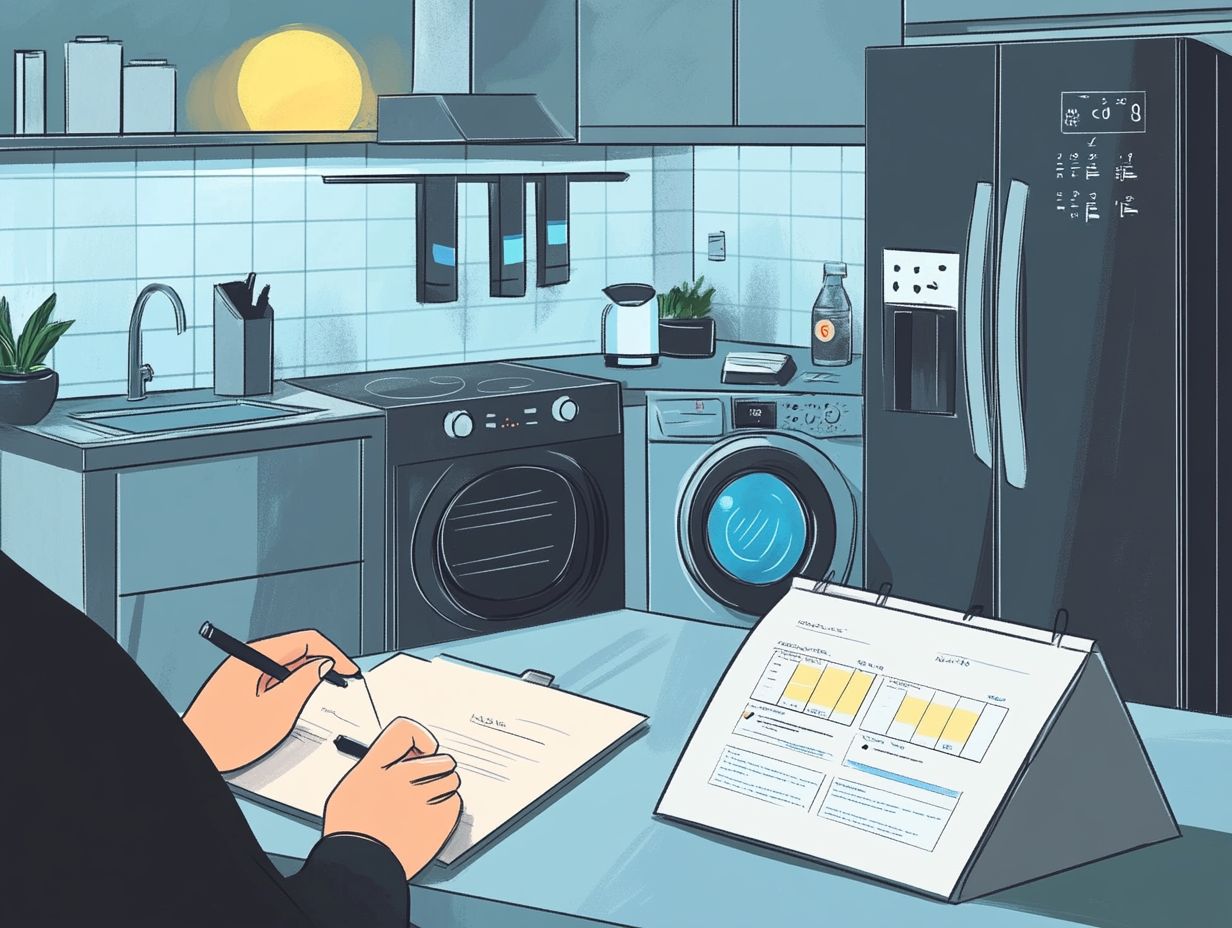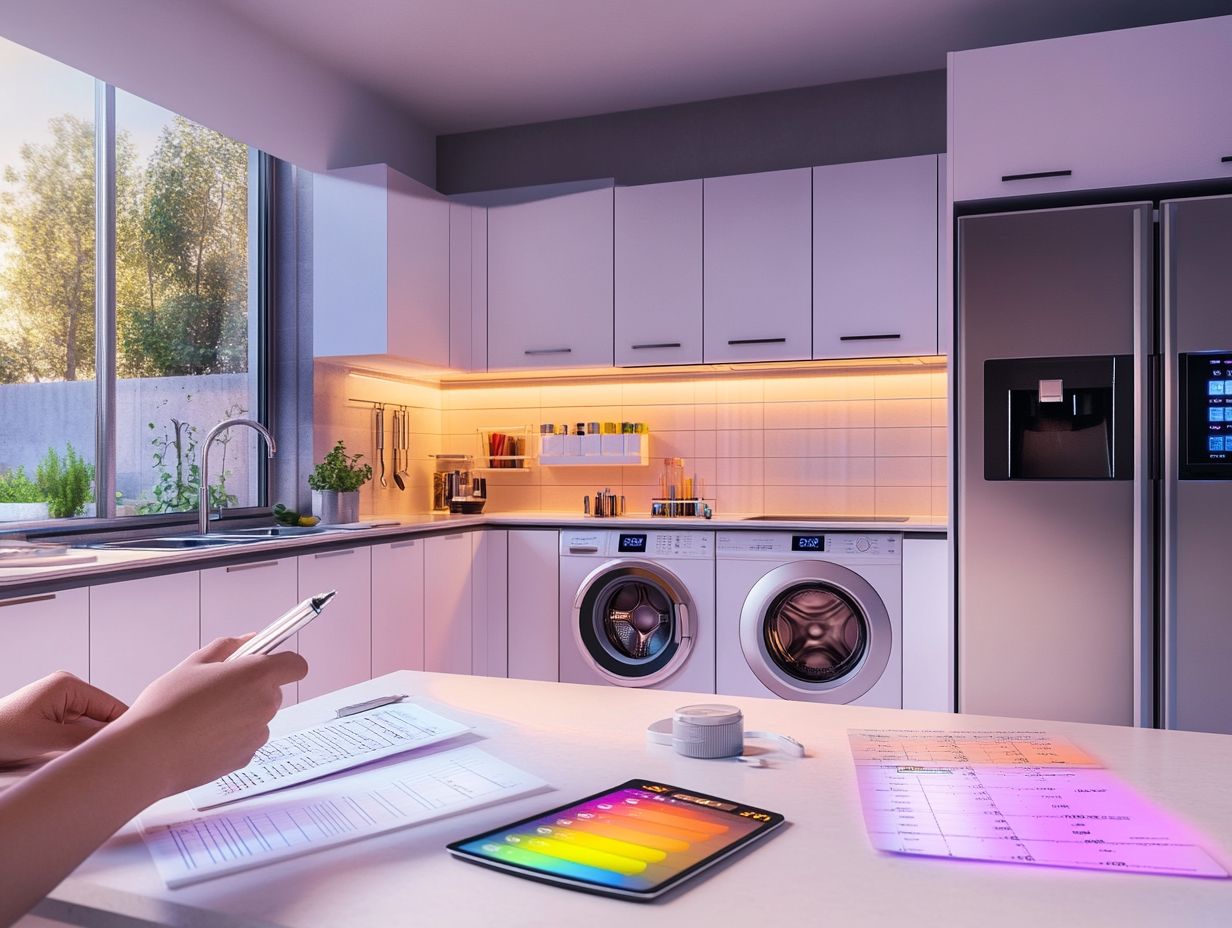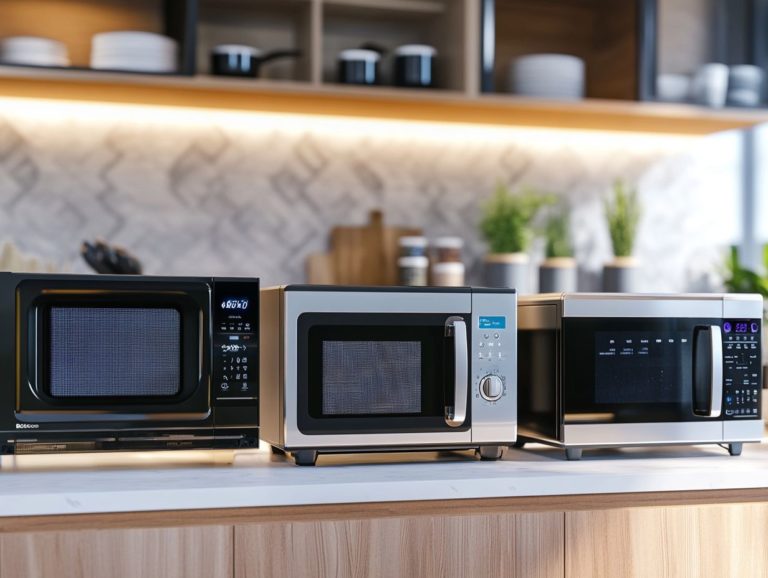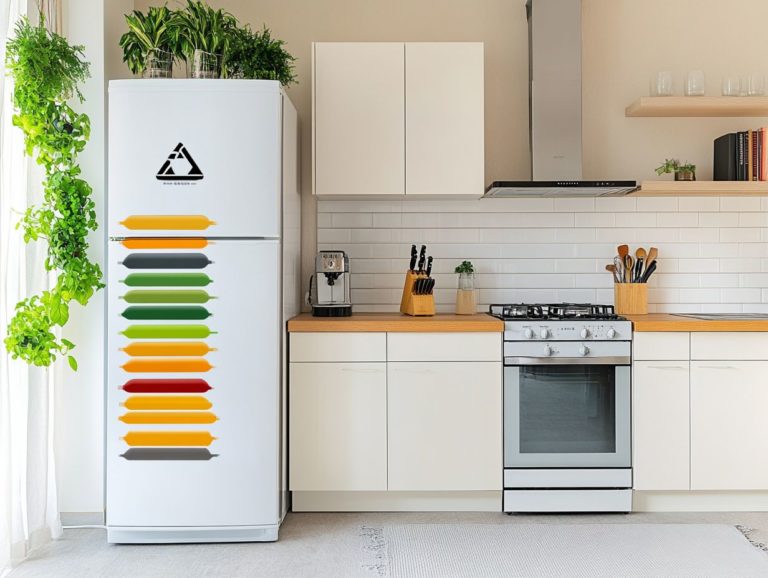Evaluating the Lifespan of Energy-Efficient Appliances
Energy efficiency ratings are crucial for making informed decisions about your appliances. However, deciphering those numbers can often feel overwhelming.
This guide elucidates the various factors that influence the lifespan of energy-efficient appliances, such as your usage habits and the quality of the manufacturer.
You ll find practical tips for extending the longevity of your appliances, as well as key signs indicating when it might be time to consider a replacement. Explore this guide to learn how to maximize your investment while contributing to a more sustainable future.
Contents
- Key Takeaways:
- Understanding Energy Efficiency Ratings
- Factors that Affect Appliance Lifespan
- How to Extend the Lifespan of Energy-Efficient Appliances
- When to Replace Energy-Efficient Appliances
- Frequently Asked Questions
- 1. How long do energy-efficient appliances typically last?
- 2. What are the key factors that affect the lifespan of energy-efficient appliances?
- 3. Are there any benefits to replacing old appliances with energy-efficient ones in terms of lifespan?
- 4. How can I accurately evaluate the lifespan of an energy-efficient appliance before purchasing it?
- 5. Does the type of energy source used affect the lifespan of energy-efficient appliances?
- 6. Can regular maintenance and cleaning help prolong the lifespan of energy-efficient appliances?
Key Takeaways:

Regular maintenance and proper usage habits are crucial in extending the lifespan of energy-efficient appliances.
Understanding energy efficiency ratings can help you make informed decisions when purchasing appliances.
Actively monitor wear and tear; knowing when to replace an appliance can save you time and money!
Understanding Energy Efficiency Ratings
Understanding energy efficiency ratings is essential for homeowners. It helps reduce their energy footprint and amplify energy-saving capabilities.
These ratings offer valuable insights into the energy consumption of household appliances, enabling you to make informed choices about energy-efficient models. The ENERGY STAR label, established by the U.S. Environmental Protection Agency, indicates that a product meets rigorous energy efficiency standards.
This not only helps you lower your utility bills and overall energy costs, but also plays a vital role in contributing to energy conservation efforts.
What Do the Numbers Mean?
The energy efficiency ratings you encounter represent the energy consumption of appliances. These numbers can vary significantly depending on performance and design.
Take the Seasonal Energy Efficiency Ratio (SEER) for HVAC systems, for example. This rating helps you understand how well a system cools your home throughout the year. A higher SEER score signals better energy efficiency, leading to lower utility bills and a smaller carbon footprint.
Similarly, ENERGY STAR scores measure the performance of various household appliances, enabling you to quickly identify products that adhere to energy-saving standards.
By grasping these ratings, you can confidently assess your options and select appliances that deliver optimal performance while aligning with your commitment to sustainability and cost savings.
Factors that Affect Appliance Lifespan
Numerous factors directly influence the lifespan of your appliances, especially when it comes to energy-efficient models. These appliances are crafted to optimize energy usage, delivering significant savings on energy costs over time, as highlighted in the long-term benefits of energy-efficient appliances.
Regular maintenance, your usage habits, and the overall quality of the appliances are crucial in determining how effectively they will serve you. Additionally, understanding the positive impact of energy-efficient appliances can help extend their lifespan by minimizing wear and tear on essential components.
Keep these factors in mind when choosing your appliances for the best results!
Usage and Maintenance Habits

Your usage and maintenance habits play a crucial role in determining the energy consumption and efficiency of your appliances, ultimately influencing their lifespan and performance.
By adopting best practices, such as regularly cleaning the filters in your HVAC systems, you can enhance airflow and reduce energy costs. This not only helps maintain optimal performance but also extends the life of the system.
Utilizing energy monitors allows you to track your consumption patterns over time, making it easier to identify potential energy drains and unnecessary usage. These energy-saving strategies contribute to a healthier environment and ensure your appliances operate more efficiently. This saves you money in the long run while preserving the functionality and longevity of your essential home devices.
Manufacturer Quality and Design
The quality of the manufacturer and the design of household appliances are crucial factors that significantly impact their performance and longevity, especially for energy-efficient models.
When you select appliances from reputable manufacturers, you’re not just making a purchase; you’re investing in technology that has been thoroughly tested for quality and performance. These esteemed brands often utilize high-quality materials and innovative designs that boost efficiency and stand the test of time.
A well-established name in the industry typically emphasizes stringent quality control measures and advancements in energy-saving technologies. This commitment ensures that your appliances operate at peak performance while drastically reducing energy consumption. Ultimately, this leads to lower utility bills and a smaller carbon footprint.
In the long run, choosing trusted manufacturers can yield considerable savings and contribute to a more sustainable living environment. Start today and ensure your appliances work their best for you!
How to Extend the Lifespan of Energy-Efficient Appliances
Extending the lifespan of your energy-efficient appliances requires a thoughtful approach to usage and maintenance. Use best practices to improve performance. This also saves you energy.
Regular inspections and routine maintenance are key. They ensure that your appliances operate at peak efficiency, minimizing energy consumption and prolonging their functional life.
You can use smart home technology and energy monitors to track how your appliances perform, allowing you to identify potential issues before they escalate into costly repairs.
Proper Usage and Maintenance Tips
Implementing proper usage and routine maintenance tips for your energy-efficient appliances can significantly enhance their performance and longevity while reducing energy consumption.
Embrace practices such as regular inspections to catch any signs of wear and tear. Also, ensure that filters are cleaned frequently to greatly improve both efficiency and lifespan.
Utilizing energy monitors offers invaluable insights into actual energy consumption, enabling you to identify patterns and make necessary adjustments.
When you take these proactive measures, each appliance operates more smoothly. You’ll likely see a decrease in your overall utility bills, leaving you with more savings for what truly matters. Indeed, a little maintenance goes a long way in maximizing both performance and cost-effectiveness.
When to Replace Energy-Efficient Appliances

Understanding when to replace energy-efficient appliances is essential for maintaining optimal energy efficiency and reducing household energy costs, as outlined in our guide on the costs of energy-efficient appliances.
Recognizing the signs of wear and tear allows you to make informed decisions about appliance replacement. Aging appliances tend to become less efficient and contribute to higher energy consumption.
Being aware of advancements in energy-efficient technology encourages you to consider upgrades that enhance your home s efficiency and offer substantial financial benefits, including lower utility bills.
Signs of Wear and Tear
Recognizing the signs of wear and tear in your appliances is crucial if you’re dedicated to maintaining their performance and managing energy costs effectively.
These indicators often reveal themselves in various forms, such as unusual noises during operation that could hint at mechanical issues or loose parts. It s also important to pay attention to inconsistent performance; if your oven isn t cooking evenly or your clothes aren t drying properly, that s a clear signal something may be amiss.
A sudden spike in your energy bills can serve as a red flag, indicating that your appliances may be operating inefficiently. If you notice these signs, act quickly! It s time to think about replacing the appliance to ensure you re maximizing energy efficiency and maintaining optimal functionality.
Calculating Cost-Effectiveness of Replacement
Calculating the cost-effectiveness of replacing your aging appliances means looking at their energy efficiency. You ll want to consider the financial benefits and potential savings on energy bills.
Start by gathering data on the current energy use of your older units. Then, compare this to newer, energy-efficient models.
This evaluation shows your current costs and the chances of future repairs. By analyzing these factors, you can see the long-term savings from upgrading versus the maintenance costs of older appliances.
This informed approach helps you make smart decisions that lead to significant savings and a smaller carbon footprint. Ultimately, it creates a more efficient home environment.
Frequently Asked Questions
1. How long do energy-efficient appliances typically last?

Energy-efficient appliances can last anywhere from 10 to 20 years, depending on the brand, model, and usage. If you’re interested in maximizing longevity and saving on energy bills, learning how to choose energy-efficient appliances is essential, as they often last much longer than non-energy-efficient options, which typically last around 8 to 12 years.
2. What are the key factors that affect the lifespan of energy-efficient appliances?
The lifespan of energy-efficient appliances can be influenced by factors such as brand and model quality, frequency of use, maintenance and cleaning, and external conditions like temperature and humidity. To ensure you’re making informed choices, learn how to assess energy-efficient appliance performance.
3. Are there any benefits to replacing old appliances with energy-efficient ones in terms of lifespan?
Yes, replacing old appliances with energy-efficient ones can positively impact their lifespan. Energy-efficient models are designed with durable materials and advanced technology, making them more reliable and longer-lasting. Additionally, understanding the environmental impact of energy-efficient appliances can further encourage responsible choices.
4. How can I accurately evaluate the lifespan of an energy-efficient appliance before purchasing it?
To evaluate the lifespan of an energy-efficient appliance, look for product reviews and ratings from reliable sources. Additionally, consider examining the cost-effectiveness of energy-efficient appliances and ask the manufacturer or retailer about the expected lifespan, while checking for any warranty or guarantee information.
5. Does the type of energy source used affect the lifespan of energy-efficient appliances?
Yes, the type of energy source can affect the lifespan of energy-efficient appliances. For example, gas-powered appliances may last longer than electric-powered ones due to the nature of their energy source.
6. Can regular maintenance and cleaning help prolong the lifespan of energy-efficient appliances?
Yes, regular maintenance and cleaning can significantly extend the lifespan of energy-efficient appliances. Proper care, such as cleaning filters and coils, can prevent malfunctions and increase the appliance’s efficiency, leading to a longer lifespan.






